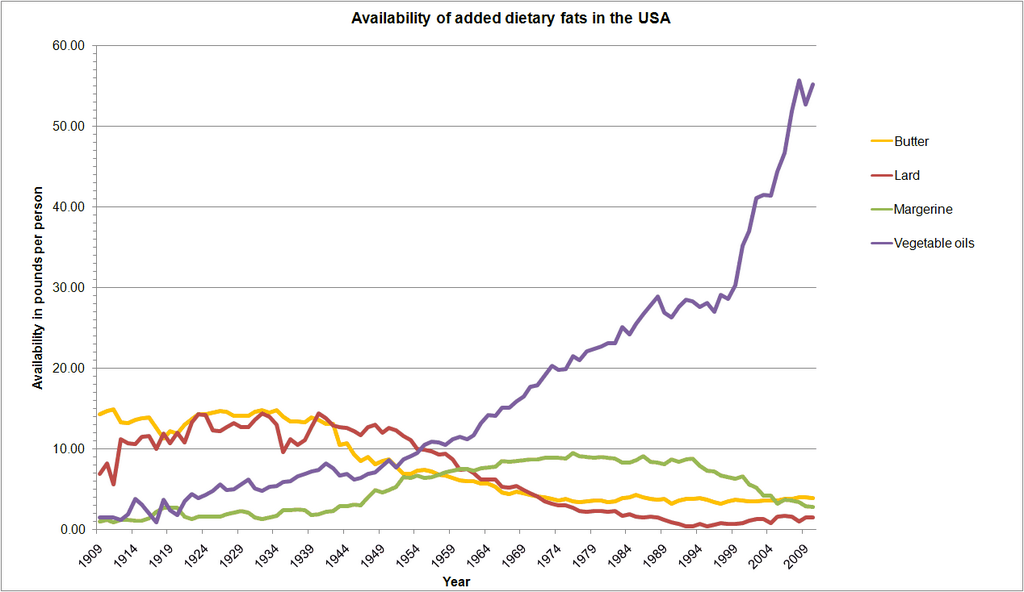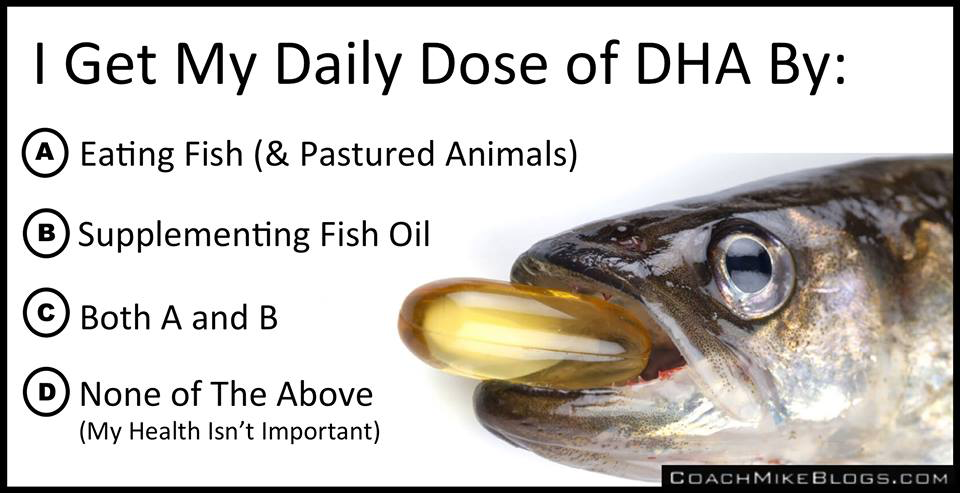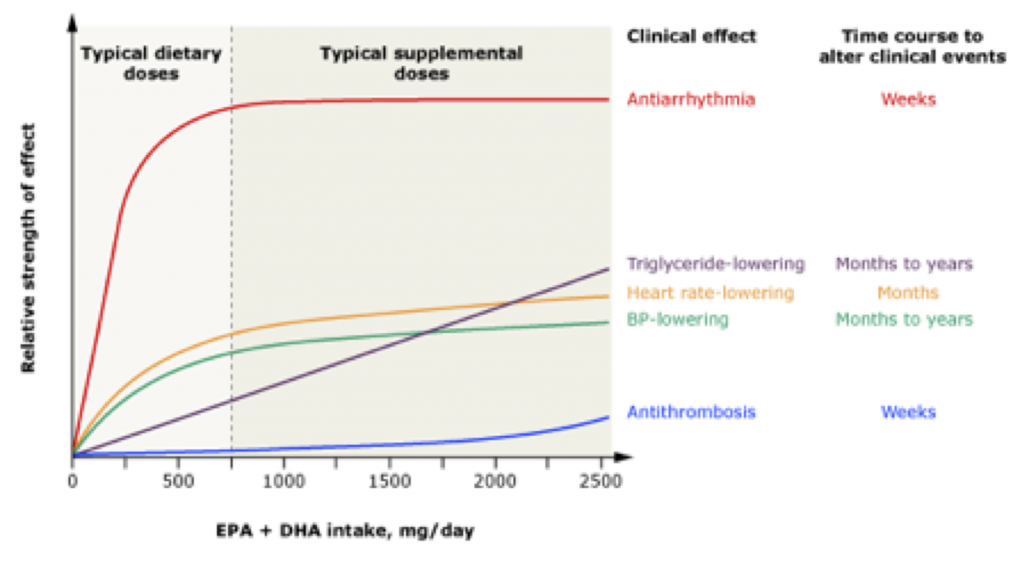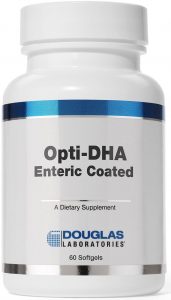Our bodies can’t make omega-3’s, which is why they’re classified as ‘essential’ fatty acids (EFAs). This means we need to consume fish or high-quality meat on a regular basis, or we run the risk of deficiency.

Vegetarians will attempt to tell you otherwise, but plant foods only contain short-chain omega-3’s (ALA) – which have an extremely weak conversion rate (2-10%) to the long-chain form that’s usable by humans (EPA and DHA). With some evidence suggesting that attempting to raise blood DHA status with strictly an ALA omega-3 source is nearly impossible.
Compared to omnivores, vegetarians have approximately 30% less EPA & DHA and vegans 50-60%.
That being said, meat-eaters are far from being off the hook – as there needs to be a balance between omega-6’s and omega-3’s, and the low-quality food cheap cooking oils characteristic of the 21st century have us consuming WAY too many omega-6’s.

This not only increases our need for omega 3’s, but it increases our risk of developing a degenerative disease. Since unlike the anti-inflammatory omega 3’s, omega 6 fatty acids promote inflammation.
High 6:3 = High Inflammation = High Risk of Disease
Knowing that our virtually disease-free hunter-gatherer ancestors maintained a ratio of 1:1, while the average North American has a ratio of 25:1, it shouldn’t come as a surprise that we’ve seen a steady increase in cancer, arthritis, heart disease, Alzheimer’s, and other degenerative conditions.
A 2007 study in the journal Neurology monitored 8,000 people over the age 65 for four years, and saw 280 of them develop dementia or Alzheimer’s. With the data ultimately showing the following conclusions:
- Non-fish eaters had a 37% higher risk
- Daily fish eaters had a 44% reduced risk
- Those supplementing omega 3’s had a 60% lower risk
- Those not supplementing omega 3’s had double the risk
Fortunately, those following Live It NOT Diet! are already reducing their omega-6 intake; by sticking to saturated fats, avoiding PUFAs, and eating nuts and seeds sparingly. But we also need to ensure we’re getting an adequate intake of omega-3’s.

Obviously, eating more fish is the best approach. And sticking to wild and grass-fed meat helps tremendously (as animals fattened up with grains end up with a 3-5 times higher omega 6:3 ratio in their tissue). But this is not always possible – especially if you don’t like fish – and it doesn’t fully make up for the excess omega 6’s we’re exposed to. Leaving us with no choice but to supplement.
The good news being, that supplementation alone can result in tremendous health improvements:
- Lowers All-Cause Mortality (1)
- Reduces Cancer Risk – Breast (1), Prostate (1), Colorectal (1, 2), and Overall (1, 2, 3)
- Reduce Heart Disease Risk Factors (1, 2, 3, 4, 5) and Progression of Atherosclerosis (1, 2, 3)
- Improves Insulin Sensitivity and Symptoms of the Metabolic Syndrome (1, 2)
- Prevents Heart Attack and Stroke (1, 2, 3)
- Increases Strength and Muscle Development (1, 2)
- Improves Gut Health (1)
- Prevents Psychological Disorders and Improves Cognitive Performance (1, 2, 3)
This is likely the case because of reductions in inflammation. Although research has shown that EVERY cell in the human body is omega-3 dependent, so supplementation is clearly providing additional support.
Fish Oil Supplementation – How Much & What Kind?
When looking at the heart specifically, fish oil appears to reduce blood pressure, raise HDL cholesterol, lower triglycerides and change small dense LDL particles into large fluffy (benign) ones. With significant improvements in all heart disease biomarkers seen at doses of 750mg/day, and a continued reduction in triglycerides as intake rises (linear dose-response).

Other research has suggested that higher doses (>2g/day) may be more beneficial in preventing inflammation (cytokines), and one study testing 12g/day of fish oil for 2 years showed no negative impact on health.
Currently, the FDA recommends 2g of EPA and DHA per day, and dosages of 3g are ‘Generally Recognized As Safe’ – which equates to anywhere from 4-6g of fish oil per day (as we’re lucky to get EPA and DHA in 50% of the oil), and 1 tablespoon of the liquid or 2-3 softgels (depending on the brand).
Daily Omega-3 Dosage – 5g of EPA/DHA rich Fish Oil
If you’re still consuming conventionally raised beef, you may want to consider a second 2.5g dose (total 7.5g) to counteract the extra dose of omega-6’s that come with grain-fed cattle.
And for those with a significant amount of excess bodyfat, another 2.5g may not be a bad idea (total 10g), as there’s the added benefit in triglyceride lowering without any added risk.
When it comes to brain health, we want to be sure we’re supplementing a fish oil product that’s high in DHA – like the one above from Douglas Labs. Since research continues to show CONSIDERABLE differences in brains that have it compared to brains that don’t.
For instance:
A 2003 study from the Archives of Neurology, looked at 815 individuals aged 65-94 years, and found that those consuming the highest amount of DHA had a 60% lower risk of Alzheimer’s.
The Framingham Heart Study looked at DHA in the blood of nearly 900 men and women over a approximately 10 years, finding a 47% lower risk of Alzheimer’s for those with the highest amount of DHA in their blood.
Similar to the heart, this likely has a lot to do with the anti-inflammatory nature of omega-3’s. However, its also because of the considerable impact DHA has on the function of the brain – where it assists in the manufacturing and release of neurotransmitters.

In all cases, the take-home message is that you need omega-3’s – whether you get them from fish, or you get them from fish oil. And if you’re still relying on crappy corn-fed cattle and exposing yourself to the excessive omega-6 oils used at restaurants and in pre-packaged products, you probably need a lot of them.
…so I suggest you start figuring out how to do that.
Stay Lean!
Coach Mike
RELATED ARTICLES:
Why Grass-Fed Meat is Worth It
But My Doctor NSAID To Take These

